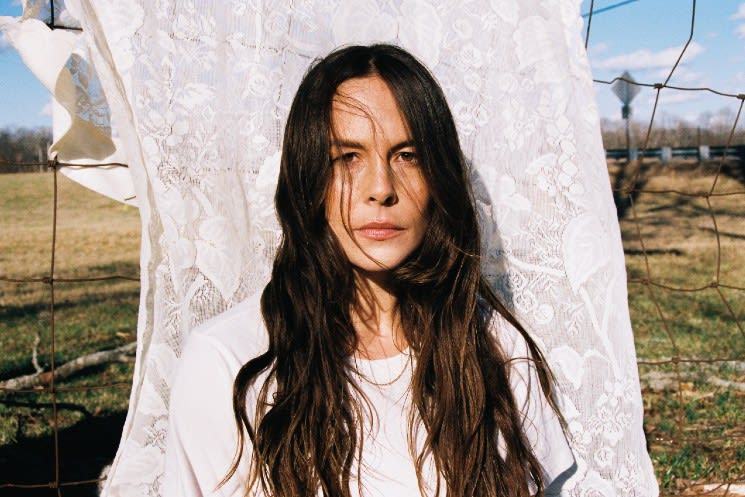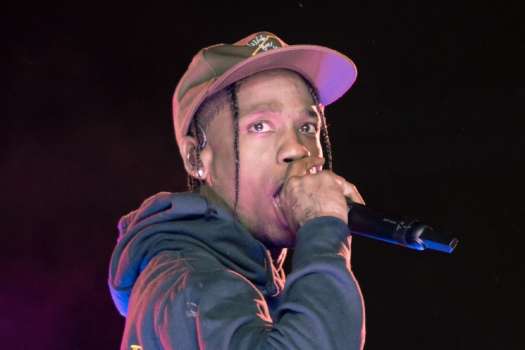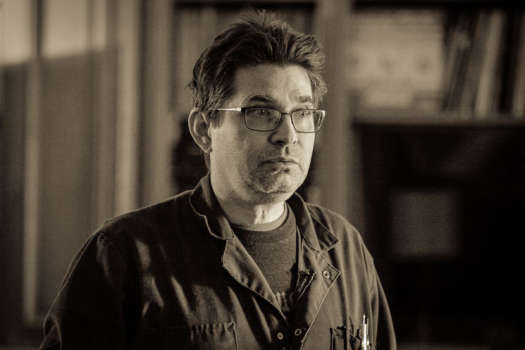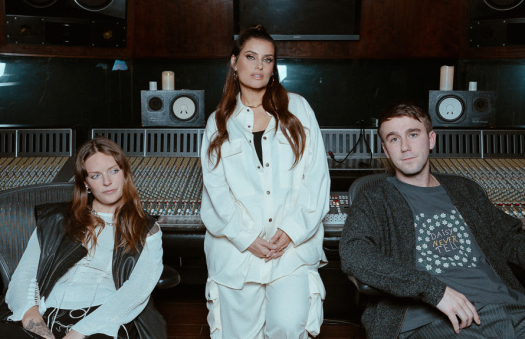"I would rather hear what it means to you," Madi Diaz says, turning my own question on me. It's December when I reach her over the phone from Nashville and ask about her new album Weird Faith's richly poetic title, and although its meaning is difficult to articulate, the sentiment resonates on a gut level.
"'Faith' is such a triggering word for so many people," the singer-songwriter notes, adding that she very much identifies as a to-each-their-own person: "Whether you believe in a bearded dude in the sky or maybe some sort of gargoyle in the underworld or whatever, I love and respect that for you," she says. "Because the feeling of faith is kind of indescribable to me. It's just this peace, and I have been able to conjure a lot of that for myself over the past few years, thankfully."
Specifically, it was over Zoom with a Nashville great, Lori McKenna, whom Diaz views as a giant — both as an artist and a human being — when the title Weird Faith presented itself. Diaz was falling in love with her now-ex-partner and talking about the edge-of-the-cliff moment where you remember every past point at which you've let yourself down and had to pick yourself back up again. "It's hard to keep learning how to trust fall with yourself," she says, "but I really like this guy. I get a good feeling about him. So [it's] having some weird faith and walking forward."
A sense of forward motion and this kind of self-reassurance propels her sixth album (out February 9 on ANTI-) and Diaz in general, who has been doing this for a while. Her last record, 2021's excellent History of a Feeling, found her opening up for Harry Styles. But delving into her wider discography reminds me that, somewhere in the depths of old hard drives and iPods, I have a Bandcamp download of Diaz's debut 2007 offering, Skin & Bone, that is otherwise nowhere to be found on the internet anymore. The brooding refrain of a song called "We Were Wrong" sticks with me like muscle memory.
Weird Faith has moments that I know will stick with me in the decades to come, too. Take "Kiss the Wall," which features Diaz repeating the phrase "Nothing is a waste of time" like a mantra with such conviction that listeners can't help but be compelled to buy in. She tells me they're words she's still trying to live by, especially at the end of the "however-many-year" relationship that inspired much of the album, but that the scope can also be as narrow as waiting in line at the pharmacy or being stuck in traffic.
"I am, in this season of things, just really trying to find a way to be softer. Like, generally; to myself, to people around me," she reflects. "From the second I wake up, you know, my tendency is to just go really hard and get it done — and stressing out or coming from this place of getting through or overcoming."
The singer-songwriter calls it "yogic," the realization of being so uncomfortable in just being. "Learning what that feels like and allowing yourself to just be there, it's a whole-ass thing," she laughs.
It was in this spirit of openness that she approached sessions with co-writer (and tour support act) Olivia Barton, whose distinctive voice forms a perfect alliance with Diaz as fraternal-twin conversationalists on "Everything Almost." It was Barton's first real co-writing session and her giddy, nervous energy lends itself beautifully to the song's ethos, oscillating between moments of pure, absolute belief and laundry lists of what-ifs, beginning with the opening question, "Is this something I can say I know / Or is this me being painfully, eternally hopeful?"
"Everything Almost" is far from the only song on the album to open with a question. You could say it's a recurring theme. "Why's it have to beat me up to prove to me that it was love?" Diaz asks on the title track. "Without the better days, the one-step-closer phase / Who on earth would I be?" the songwriter wonders on the timelessly loping Kacey Musgraves duet "Don't Do Me Good." She gets to the crux right from the jump on opening track and lead single "Same Risk," putting it plainly: "What the fuck do you want?"
Diaz wrote "Same Risk" with Steph Jones and Phoebe Bridgers's Saddest Factory Records signee Charlie Hickey. "I've been a fan of what he's been doing for a while and like to think that he doesn't think I suck. We have a bunch of mutual friends," Diaz says, explaining that the three of them got together while she was out in Los Angeles and were able to transpose the primary question — "Are we taking the same risk?" — that had been looping in the artist's mind into a bright, bracingly honest song.
Diaz addresses questions of faith in a more traditional sense on "God Person," although even thinking of it in this way prompts her to jokingly start singing the chorus of "One of Us" by Joan Osborne. "I feel like music brings me to that place," she admits. "The mystery of writing a song and having it just kind of reveal itself to you is … the closest thing I think that I've ever felt to religion, or that kind of experience that I think some people get when they're sitting in a church."
Despite the questioning (and really, what good is faith if you're not even asking the questions?), there is a sense of undeniable certainty to Diaz's self-expression, both in conversation and in her work. "Somebody was asking me, 'How do you know when you've written a song for your record?' And it's just funny in the moment where you're just like, you just know," she recalls. "It feels like a missing block in your body that just aligns, affirms, strengthens the structure of everything that you're about."
There's knowing, and then there's choosing. And maybe they're actually deeply intertwined, especially when it comes to love. You have the strange premonition that something is right, and you choose to believe it. You choose to say it when you feel it, even if you don't yet know how the you'll-know-when-you-know cliché delivers.
"How do you keep really trying to look in the mirror and see what's there, as opposed to dressing it up and pushing it this way and that until it fits the narrative — your narrative of your desire?" Diaz wonders aloud, thinking about how to keep walking forward — how to keep the faith and how to keep it weird — in the wake of the completion of both the record and the relationship it memorializes.
"I have to love all the parts of it," she decides. "I can even hate all the parts of it, but if I could choose love, it's definitely going to make everything a little bit easier."




